Macaroni and cheese is a popular comfort food, and unfortunately most versions on the market are not very kidney friendly. But don’t worry, you don’t need to give up macaroni and cheese forever if you love it!
This post may contain affiliate links through which we may earn a small commission to help keep this website free.
Why is macaroni and cheese bad for kidneys?
Macaroni and cheese that you buy from the store is typically going to be very high in phosphorus and sodium, which is bad for people with kidney disease. Macaroni and cheese can also be high in protein – which can be helpful for people on dialysis, but problematic for people with CKD who may be trying to follow a lower protein diet.
Phosphorus in Macaroni and Cheese
Phosphorus is one of the biggest problems with macaroni and cheese. Too much phosphorus, especially from phosphorus additives, is bad for your cardiovascular system and can cause a lot of damage.
All boxed macaroni and cheese on the market (at least at the moment) contains phosphorus additives. Here is an example food label from a popular brand that comes in a blue box:
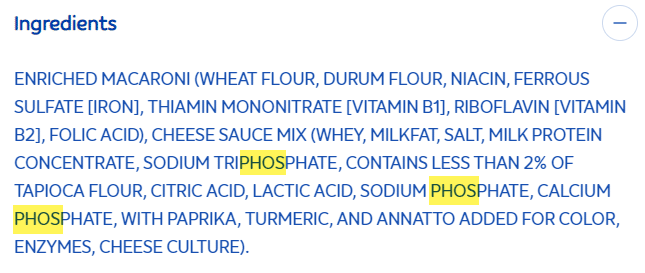
According to the USDA, one cup of prepared macaroni and cheese from a box contains 442mg of phosphorus! That is a LOT of phosphorus. Now, we don’t really know exactly how much of that is in the form of phosphorus additives, and additives are the real driver of high phosphorus levels in your body. However, if we take a look at a cup of frozen macaroni and cheese, we can see that the phosphorus content drops down to only 163mg of phosphorus. That shaved off 279mg of phosphorus!
Frozen macaroni and cheese is less likely to contain phosphorus additives, which means that it is much less likely to be high in phosphorus. You still need to read ingredient lists though because some frozen versions may still contain a phosphorus additive (and be high in sodium!)
Sodium and Macaroni and Cheese
Macaroni and cheese is a high sodium food. It is made from cheese, and cheese is almost always a high sodium food. However, if you LOVE macaroni and cheese, we can still find a way to fit it into your diet. The key is to watch your portions and choose a product that has the least amount of sodium (and no phosphorus additives).
As an example, let’s look at the nutrition label for Stouffer’s Mac and Cheese:
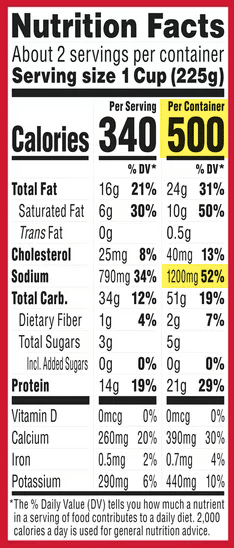
If you eat the whole box, you’ll be consuming 750mg more sodium than calories (and if you’ve been reading any of this website, you know that I typically recommend choosing foods with less sodium than calories). That is a lot of excess sodium. It will be very challenging to cut out 750mg of sodium from other meals in your day to make up for all that excess sodium.
If you eat a smaller portion, such as just one cup of mac and cheese, then you’re only consuming 350 excess mg of sodium. That’s still a lot, but definitely more manageable to cut out 350mg than it is to cut out 750mg.
If you can take the time to compare food labels (or just jump down to my list of recommendations), there are some frozen macaroni and cheese products that contain less sodium. For example, the evol Truffle Parmesan Mac & Cheese only contains 120mg of excess sodium. This is MUCH EASIER to balance out in your day that 750mg or even 350mg.
Portion size matters a lot.
Is macaroni and cheese high in potassium?
No. Macaroni and cheese is not typically considered high in potassium.
In general, if a food has more calories than potassium, we would not consider it to be high in potassium. Typical macaroni and cheese ingredients like cheese, butter, and pasta are all low potassium foods, so it is not surprising that macaroni and cheese would also be low in potassium.
Some frozen macaroni and cheese dinners can contain potassium additives, which will drive up the potassium content. For example, Lean Cuisine’s Mac and Cheese contains 570mg of potassium per serving and only 270 calories. If you look at the ingredient list, you can see that potassium has been added to the food:

If you need to follow a lower potassium diet (and many people do not!), then be sure to check food labels and ingredient lists for added potassium.
Is macaroni and cheese bad for diabetes?
Macaroni and cheese is high in carbohydrates, so a person who has diabetes and kidney disease would need to be extra mindful of serving sizes. Looking back at the Stouffer’s nutrition, if you eat the whole box, then it will have 51g of carbohydrates. Depending on your needs and what else you eat in the day, this may be an okay amount or it may be too much. Macaroni and cheese is also typically low in fiber as well.
One thing to keep in mind with macaroni and cheese is that it doesn’t contain any vegetables (and even if it does, it probably doesn’t contain enough to count as a serving). It is recommended that people with diabetes focus half their plate on non-starchy vegetables. To avoid eating too much food, you may need to reduce your portion size of macaroni and cheese so that you can include enough non-starchy vegetables.
Kidney Friendly Store Bought Macaroni and Cheese
The following frozen macaroni and cheese products contain no phosphorus additives and have less than 250mg of excess sodium per serving.
evol Truffle Parmesan mac & Cheese
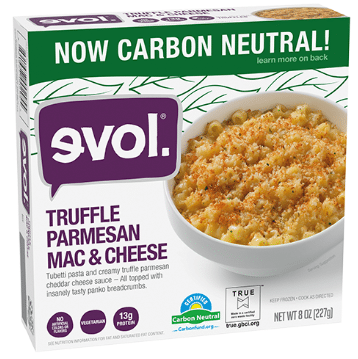
- Calories: 440
- Protein: 13g
- Carbohydrate: 44g
- Fat: 24g
- Sodium: 560mg
- Phosphorus
Additives: None - Potassium: 240mg
- Calcium: 240mg
- Fiber: 2g
- Sugar: 5g
evol Gluten Free Smoke Gouda Mac & Cheese
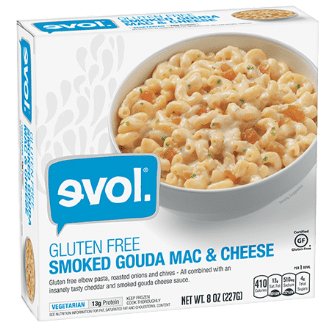
- Calories: 410
- Protein: 13g
- Carbohydrate: 40g
- Fat: 22g
- Sodium: 520mg
- Phosphorus
Additives: None - Potassium: 220mg
- Calcium: 300mg
- Fiber: 3g
- Sugar: 4g
Kidfresh Mac and Cheese
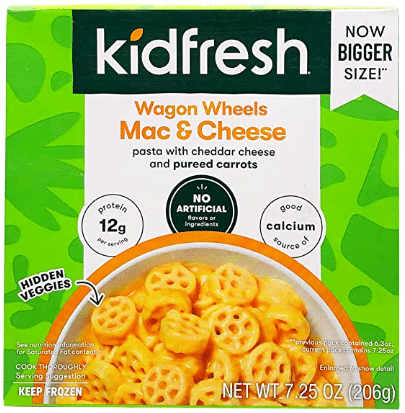
- Calories: 310
- Protein: 12g
- Carbohydrate: 41g
- Fat: 10g
- Sodium: 430mg
- Phosphorus
Additives: None - Potassium: 200mg
- Calcium: 211mg
- Fiber: 2g
- Sugar: 5g
Beecher’s World’s Best Mac & Cheese
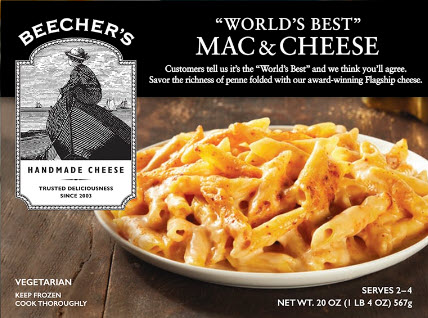
- Calories: 460
- Protein: 21g
- Carbohydrate: 41g
- Fat: 24g
- Sodium: 640mg
- Phosphorus
Additives: None - Potassium: 282mg
- Calcium: 520mg
- Fiber: 4g
- Sugar: 4g
Amy’s Macaroni & Cheese
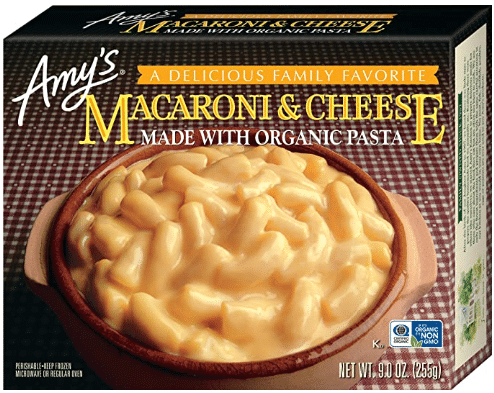
- Calories: 450
- Protein: 18g
- Carbohydrate: 55g
- Fat: 18g
- Sodium: 680mg
- Phosphorus
Additives: None - Potassium: 310mg
- Calcium: 310mg
- Fiber: 3g
- Sugar: 5g

